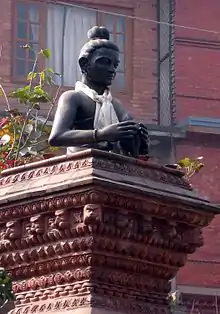Sankhadhar Sakhwa
Sankhadhar Sākhwā (Nepal Bhasa:𑐱𑑄𑐏𑐢𑐬 𑐳𑐵𑐏𑑂𑐰𑐵𑑅) (also spelt Sankhadhar Sākhwāl) was a legendary[1] Nepalese philanthropist who is believed to have paid the debts of the Nepalese people in A.D. 879. This event is commemorated as the beginning of the epoch of Nepal’s national calendar year Nepal Sambat.
Sankhadhar Sākhwā | |
|---|---|
| 𑐱𑑄𑐏𑐢𑐬 𑐳𑐵𑐏𑑂𑐰𑐵𑑅 | |
 | |
| Born | |
| Resting place | Kathmandu, modern-day Nepal |
According to Bhāsā Vamsāwali and Rājbhogmālā Vamsāwali, in A.D. 879, an astrologer from Bhaktapur, or Bhādgāon, had predicted that the sand at the confluence of the Vishnumati and the Bhadrāmati rivers would turn into gold if gathered at the right moment. So Rājā Ānanda Malla, the then king of Bhaktapur sent out his workers in search of this extraordinary sand, who were witnessed by Sākhwā, then a local merchant. Legend has it that he had only curiously bought some of it from the king’s workers. Surprisingly however, the next day, Sākhwā found that only his sand but not the king’s had turned into gold. In an act of great compassion, however, instead of using the gold for himself, he used it to pay off every other Nepali’s debts towards the king and offered it to him,[2] therefore giving the Nepali people as well as the king a reason to dedicate and mark an era in this act of great generosity.
On the 18th of November A.D. 1999 (Vikram Samvat 2056–08–02), the government of Nepal officially acknowledged and declared Sankhadhar Sākhwā as one of the National Heroes of Nepal.[3] On the 26th of October A.D. 2003, Nepal’s Department of Postal Service also issued a postage stamp depicting his portrait, commemorating Sākhwā’s generous, compassionate philanthropy.[4]
See also
References
- Sureis (2017-04-13). "Sankhadhar Sakhwa may never have existed: Experts". The Himalayan Times. Retrieved 2022-01-03.
- Wright, Daniel (1990). History of Nepal. New Delhi: Asian Educational Services. pp. 163–165. Retrieved 28 April 2014.
- Joshi, Amar Prasad (2008). "Shankhadhar Sakhwa: Founder of Nepal Samvat". The Rising Nepal. Archived from the original on 6 July 2012. Retrieved 23 January 2013.
- "NP010.03". Universal Postal Union. Retrieved 23 January 2012.